Sayed Muhammad Amimul Ehasan Barkati
Sayed Muhammad Amimul Ehasan Barkati (Urdu: مفتى سيد محمد عميم الاحسان بركتى) popularly known as Mufti Amimul Ehasan, (Bengali: মুফতী আমীমুল ইহসান) was a Sufi Islamic scholar who served as the third Khatib of the Baitul Mukarram mosque.[1][2][3][4]
Mufti Sayed Muhammd Amimul Ehasan Barkati | |
|---|---|
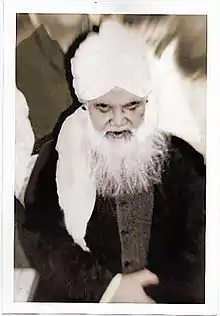 | |
| Born | 24 January 1911 (22 Muharram, 1329 Hijri) |
| Died | 27 October 1974 (aged 63) |
Notable work | Fiqhus-sunan wal Athar Qawa'idul-Fiqh Fatwae Barkati Hadiyatul Musallin |
| Awards | Islamic Foundation Award (1984) |
| Era | 20th century |
| Region | Islamic world |
| School | Hanfi Sunni Islam |
Main interests | Islamic law Hadith Fiqh Tafsir |
Early life
He was born on 24 January 1911 (22 Muharram, 1329 Hijri) Monday at Bihar state in Munger district a village named Pachna in India. His father was Moulvi Sayed Muhammd Hakeem Abdul Mannan and mother was Sayeda Sajeda. He was second among 4 brothers and 3 sisters. [5][6]His family hailed from the Feni District of present-day Bangladesh.[7]
Education
He got his primary Islamic education from his paternal uncle Sayed Abdud Dayyan. Later on, he had gained the knowledge of Tasawwuf from a Sufi scholar of India, Shah Abu Barkat Ali Shah. As he had become a murid of him, he added the title Barkati to his surname. Amimul Ehasan acquired his academic learning from the famous Calcutta Aliah Madrasah in 1926.[5][6]
Career
In 1934 Mufti Amimul Ehasan was appointed as the Imam and teacher of Calcutta Nakhoda Masjid.[5] In 1935 he also got the responsibility of Head Mufti of that madrasha's Darul Ifta. In 1943 he joined Calcutta Aliya Madrasah.[5] In 1964 he became the first khatib of Baitul Mukarram, later the national mosque of Bangladesh. He held that position until his death in 1974.[2]
Works
Mufti Amimul Ehasan's works include:
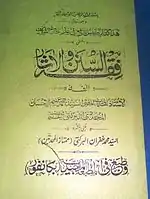
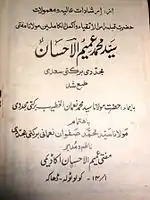
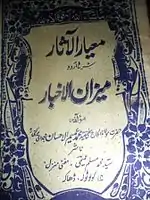
- Fiqhus-sunan wal Asar[5][6][8]
- Qawa'idul-Fiqh
- Fatwae Barkati
- Adabul Mufti
- Al usolul kargee
- Usolul masailut iktilfat
- At tasruf li Adabit Tasuuf
- At-tanjed fe tawhid
- At tanver fe usole tafseer
- Tariqe Islam
- Tariqe Ilme Haddes
- Tariqe Ilme Fiqh
- Sirajum munira Milad nama (سراجا منير)
- Tarikae Hajj
- Lubbul Usol
- Maske Fariez
- Minnatul bari
- Mijanul Akbar
- Miyarul Asar
- Wasiyatnama
- hadiyatul Musallin[6][5]
Mufti Amimul Ehasan wrote all of his book in Arabic and Urdu language. Some of them are also translated in Bangla language.
Personal life
Mufti Amimul Ehasan married Sayeda Maymuna, daughter of his mentor and a famous Sufi saint Sayed Abu Muhammad Barkat Ali shah.[5][6] His wife also died early. Then he married Sayeda Fatima and they have a son, Sayed Munim, and a daughter, Sayeda Amina. Sayed Munim was also died when he was a child. His second wife died in 1937. He married Sayeda Kadija and lived with her till his death. Among all the children of Mufti Amimul Ehasan, only her youngest daughter Sayeda Amina Khatun was alive during his death. She died in 1990. Mufti Amimul Ehasan performed Hajj three times in 1954, 1958 and in 1971 during his lifetime.[8]
Death
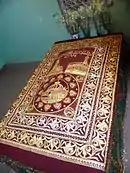
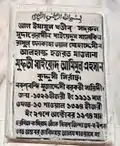
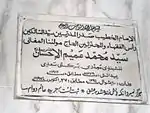
During 1973–74 Mufti Amimul Ehasan's health started to deteriorate. In the year 1974 the committee of Baitul Mukarram had some issues with him to which he decided to not go again in Baitul Mukarram for further Juma prayer. He returns the key of his room and said "I will not be coming next week". He died that week.On 27 October 1974, 10th Shawwal 1394 Hijri at midnight, Ehasan paseed away.[5][6] Next day on 28 October his funeral prayer was held at Baitul Mukarram. At the entrance in his mazar gate a Persian poem says:
هرگز نميں دانكه دل ازز نده شدبه عشق
ثبت است برجريده عالم دوام ما
- Never say death to those whose heart is filled with love of Allah
- They are alive and ever refreshed.
Recognition
Daily inqilab says he has been recognised as a Grand Mufti of Kolkata by Calcutta government of British India in 1935[5]
Alokito Bangladesh says he had received gold medal and certificates in 1974 for his contribution towards Islamic missionaries( Dawah) from Bangladesh Government[8]
References
- Safwan Nowmani,Muhammad Naimul Ehasan Barkati (2012). Eid e Miladunnabi and Milad Mahfil. Dhaka: Barkati Publications.
- "Baitul Mukarram, the glory of the city of mosques". Farjana Khanam. The Daily Sun. 22 August 2014. Retrieved 6 May 2016.
- "Baitul Mukarram National Mosque". BD Affairs. Retrieved 18 May 2016.
- "ভারপ্রাপ্ত খতিবে চলছে বায়তুল মোকাররম". Daily Nayadiganta (in Bengali). Retrieved 2020-06-04.
- "Hadis vicharak Muhaddis ameemul ehsan er jiboni o karm". The Daily Inqilab (in Bengali). 3 June 2020.
- মুফতি আমীমুল ইহসান. sylheterdak.com.bd (in Bengali). Retrieved 2020-06-04.
- "Feni at a glance". Feni Samity Dhaka. Retrieved 2 May 2016.
- Alokito, Bangladesh (June 2020). মহা মনীষী মুফতি আমিমুল এহসান (in Bengali).